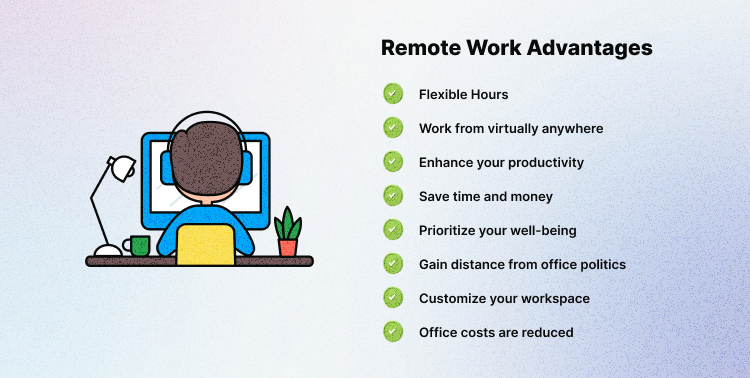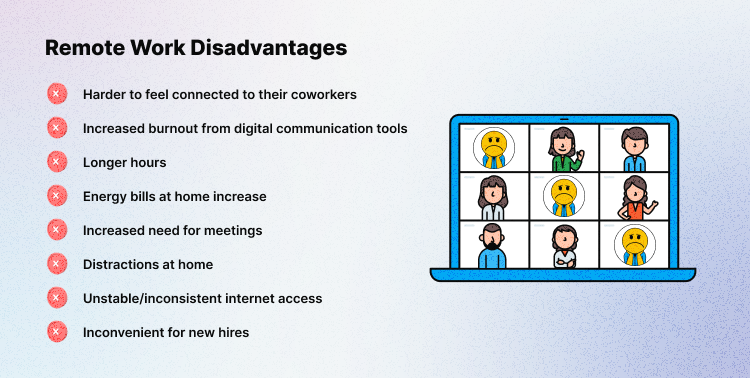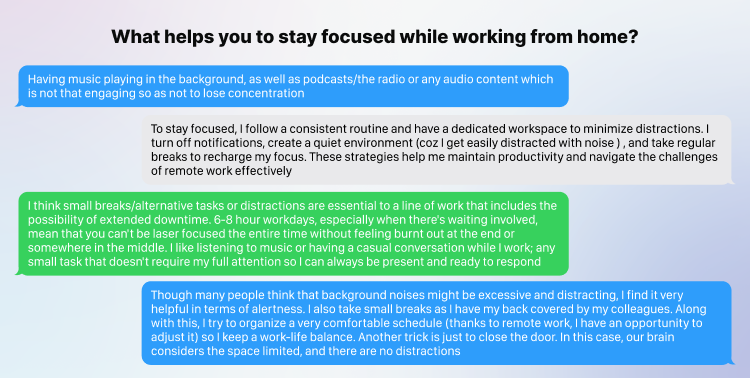One of the primary benefits of remote work is the cost savings it offers. When freelancers or full-time employees work from home, they can avoid expenses related to transportation and food. This means they don't have to spend money on bus passes, cabs, gasoline, morning coffee on the go, or business lunches. But, the advantages of remote work extend beyond financial savings.
Let's explore them in more detail.
The Advantages of Remote Work

1. Time Savings
While having an office just a few stops away from home can be convenient, not everyone is fortunate enough to enjoy such proximity. In bustling cities, commuting can eat up hours—two hours to get to work and another two to return home is not uncommon. This kind of commuting drains a person's energy and can lead to burnout. Even a substantial salary might not make up for the toll it takes. Remote work provides an opportunity to reclaim these hours for more meaningful activities: hitting the gym, taking leisurely walks, or spending quality time with loved ones.
2. Comfortable Work Environment
Some people find working in a team setting challenging, decreasing productivity. For such individuals, remote work becomes a solution that benefits both them and their employers. Working from home allows these employees to create a comfortable and conducive work environment, resulting in heightened productivity. This improves the employee's work experience and gives the employer a more effective and efficient team member.
3. Access to Prominent Companies
While many large corporations are headquartered in major cities, not everyone has the ability or desire to relocate. The emergence of remote work opportunities from prominent companies, opens doors for candidates from all parts of the globe. This inclusivity in hiring allows skilled professionals from different cities and countries to contribute their expertise to well-established companies without uprooting their lives.
In general, remote work goes beyond mere financial savings. It gives employees the potential for better time management, the freedom to craft a comfortable work environment, and the chance to work for reputable companies regardless of their geographical location.

What AADS employees say
What are the Advantages of Remote Work for Employers?
After the COVID pandemic 2020 and the self-isolation period, 20% of employers expressed a desire to continue using the remote work format for their workforce. Here are the key benefits associated with this mode of operation:
1. Expanded Talent Pool
One of the primary advantages of remote work for employers is the ability to tap into a broader range of candidates, no matter where they live. It broadens the scope of potential employees and increases the likelihood of finding workers with precisely the required skill sets. For instance, hiring a remote employee becomes feasible if a company in a particular region needs an experienced chief editor, but no such specialists are available locally.
2. Process Flexibility
This advantage directly stems from the expanded talent pool. With the ability to select employees from different locations, companies can swiftly find replacements in cases of illness, project departures, or missed deadlines. This flexibility in personnel ensures that operational continuity is maintained, contributing to smoother project management.
3. Cost Reduction
Transitioning to a remote work model can lead to significant company cost savings. Reducing office-related expenses—such as rent, utilities, maintenance of facilities like coffee machines and air conditioners, cleaning services, security measures, and printer paper— brings financial benefits to a company. These funds can then be reallocated to other strategic initiatives and get a more efficient allocation of resources.
In summary, adopting remote work practices gives employers the advantages of accessing a wider talent pool, flexibility in managing their workforce, and substantial cost savings.
Drawbacks of Remote Work for Employers
While remote work offers several advantages, this format also has some disadvantages:
1. Control
If remote workers operate without any oversight, it may negatively impact the quality of their work.
2. Employee Evaluation
Hiring remote employees presents challenges for HR specialists, as they lack the opportunity for in-person interactions with candidates. As a result, they must assess candidates' professional and personal qualities from a distance. This absence of face-to-face contact can potentially lead to misunderstandings or incomplete assessments.
How to Effectively Implement Remote Work and Conquer Challenges

Remote work means doing the same complex tasks, having meetings, and talking to colleagues. We've researched how to smoothly switch to remote work and keep being productive.
Problem 1: Physical Fatigue
When you work from home, a common problem is sitting still for a long time. In a regular office, you usually move around more because of commuting and the office setup. But when you work from home, you might not move as much, which can make your body uncomfortable, like having a sore back or neck. You might also get headaches or dry eyes if your workspace isn't set up well.
Solutions:
Here are some ways to make your remote work setup better:
Change How You Sit: Switch between lying down, standing, and sitting in a chair with good back support to help your back and neck feel better.
Set Up Your Screen Right: Put your computer screen at the right angle and not too close to your eyes. Make sure the screen isn't too bright. Keep the center of the screen a bit lower than your eyes. If you use a laptop, raise it up with a book or stand. When you sit at a table, your arms should have a comfortable bend and rest on the table.
Sit Up Straight: Remember to sit with good posture to keep your back comfortable. If your chair doesn't support your back, try using a cushion.
Control the Lighting: Make sure the lighting in the room is suitable for work. Bright, cool light is better for mornings, and soft, warm light is good for evenings. If your workspace is near a window, make sure the light doesn't shine on your screen.
Take Breaks: Plan short breaks during your workday to stay productive and avoid getting too tired. You can use alarms or software to remind you to take breaks. If you're tired, take a break even if it's not your official break time.
Do Finger Exercises: Try simple finger exercises to help you focus better on your work. These exercises can help refresh your mind and bring back your focus.
Problem 2: Feeling Tired Emotionally
When working from home, there's a unique challenge called emotional tiredness. Without being in an office, we miss out on the small things like faces, gestures, and being close to others that help our brains understand conversations. This can make us feel stressed because we're social creatures who enjoy talking in person and seeing emotions. Even small things like a boss's little smile can make us feel good. These tiny interactions are important for our happiness.
Going to and from the office is a way to transition from home to work mode and back. But it's hard to create this transition when we work from home. Our minds struggle to switch from relaxation to work. Also, when we work from our bed or couch, it's easy to mix work and free time, which can cause stress. Strangely, being unable to fully stop working makes it hard to fully relax at home.
Solutions:
Make a Clear Schedule: Create a schedule that says when you work and when you take breaks. This way, you won't feel like you have to work all the time because you'll know when to stop.
Create Transition Habits: Make up your habits to switch from home to work mode. You could take your dog for a walk, change your clothes, or pick a specific place to work, like the living room table.
Talk to Others: Don't feel alone while working from home. Try to meet up with friends or coworkers every now and then. This will help you feel connected and less emotionally tired.

What AADS employees say
Problem 3: Having Trouble Staying Focused
An office has a setup that helps us work—special places to work, planned breaks, and coworkers working together. But when we work from home, it's not the same. We might find concentrating hard because we're not used to the new surroundings.
Solutions:
Make a Good Place to Work: Set up a spot just for working. A comfy chair and a clean desk are important. Keep distractions away by keeping your workspace clean. Even little things like toys or keys can make you lose focus.
Choose Your Work Music: Some people wear headphones when they work at home. This helps block out noise. Pick music that helps you work well. Stick to simple music—avoid podcasts, shows, or movies because they can make you lose focus. If you like silence, try using headphones that cancel out noise or use earplugs.
Stop Putting Things Off: Sometimes, when we work from home, we delay things we need to do. Small tasks like cleaning up or checking social media can detract from important work. To fix this, decide when you'll work and when you'll do other things at home. During work time, focus on work, and do household tasks later. Remember that work comes first during work hours.
Make Big Tasks Small: If you have a big project, it's easier to do if you break it into smaller parts. For example, if you're making a website, you can break it into steps like studying the audience, writing the text, and making a rough version. Doing things step by step makes you work better. Give yourself a reward when you finish each step to stay motivated and positive.
Problem 4: Mixing Work and Family Time
Working from home means you can do daily tasks and spend time with your family when needed. But this can make it hard to have a clear work routine. It's not easy to explain to young kids when you can't play with them. The biggest problem is that work and personal time start to mix up. You might end up working on weekends and late at night without realizing how much time is passing.
Solutions:
Plan Your Workday: Use a smart plan for your workday. Set the alarm, write down meetings and calls in your calendar, and decide when you'll do different tasks. Look up tips for managing time or watch videos about it. This helps you avoid getting too tired, keeps your energy up, and ensures you finish your tasks on time.
Know When Others Work: Find out when your coworkers like to work and decide on your own work hours. Just because you want to work after 6 PM doesn't mean your coworker wants to. They might not like getting work emails at 9 PM. Talk to them to know when they're available and discuss what to do if something special comes up.
Talk to Your Family: Before you start working, talk to your family. If you have kids or others living with you, tell them when you can't play and when you'll take breaks for family time. You can put up a schedule where everyone can see it if you live with many people. This reminds you and others about when you're working.
Problem 5: Working Together When Apart
In an office, it's easy to talk to coworkers directly. But things change when you work from home. Slow internet, problems with communication, or sudden power cuts can make it hard to talk and work together. This can slow down work and affect everyone involved.
Solutions:
Be Ready for Problems: Think about what could go wrong and plan for it. If someone can't send an image, have another way to do it. Know who can step in if needed. Ask managers for help if you're not sure what to do. Look at how much work everyone has to make good choices.
Know When to Talk: Talk to coworkers when it's okay for them. While funny videos can be nice, too many can make work slow. Decide when and who you should talk to so everyone can work well.
Ask Before You Call: Calls can help talk about things quickly. But make sure to ask if it's okay to call or use chat to get permission. Messages like emails are better because they let people think before answering, even if it's not fast.
Use Email for Important Stuff: Email is good for talking about important things. You can send files and links, and it's organized. It's better than instant messages for big talks.
Write Down What You Agree On: After talking to coworkers or bosses, write an email to remember what you discussed. This stops problems and confusion later.
Share Updates Often: Tell your team how you're doing often, like every day or every week. This helps everyone know how things are going and stop secrets.
Even if working from home has problems, many people still like it. Remember that you can find good ways to deal with these problems by being ready and open to change. Working from home is mostly good, even if it's not always easy.
References and Useful Links:
"Remote Work Benefits and Challenges: Tips for Employers and Employees" - Provides insights into the benefits and challenges of remote work for both sides, with practical tips for effective implementation.
"Remote Work Best Practices: How to Stay Productive and Sane" - Offers actionable advice on managing the physical and emotional challenges of remote work while maintaining productivity and well-being.
Link: https://www.inc.com/guides/2010/05/effective-remote-working.html
"Remote Work Transition: A Comprehensive Guide for Employers" - A guide for employers on effectively transitioning to remote work, including strategies for maintaining team productivity and overcoming common challenges.
Link: https://www.flexjobs.com/employer-blog/remote-work-transition-guide/
"The Psychological Impact of Remote Work" - Explores the psychological aspects of remote work, its impact on emotional well-being, and strategies to address emotional tiredness and feelings of isolation.
Link: https://www.apa.org/monitor/2021/03/remote-work-psychological










